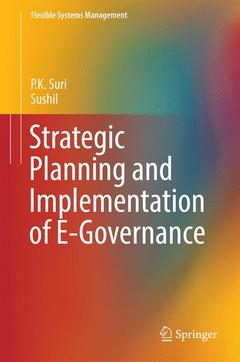Description
Strategic Planning and Implementation of E-Governance, 1st ed. 2017
Flexible Systems Management Series
Authors: Suri P.K., Sushil
Language: English
Subjects for Strategic Planning and Implementation of E-Governance:
Keywords
Collaborative E-Governance; Collaborative E-Government; Digital India Programme; E-Governance; E-Government; E-Governance Planning; E-Governance Implementation; E-Governance in Agriculture; E-Governance Performance; Methodology for Case Study; Participatory Governance; Public Service Delivery; SAP-LAP Framework for Case Studies; Strategy Execution; Strategy Implementation; Strategic Management; Strategic Planning
Publication date: 09-2016
Support: Print on demand
Publication date: 07-2018
Support: Print on demand
Description
/li>Contents
/li>Biography
/li>Comment
/li>
The book is based on practical experience gained during the planning and execution of e-governance projects in India coupled with extensive research based on six national/multi-state-level agriculture related projects. It assesses e-governance projects in terms of desired project outcomes and analyzes performance from the viewpoints of three key groups ? planners, implementers and beneficiaries. It highlights six constructs: extent of planning, comprehensiveness of strategy formulation, effectiveness of strategy implementation, changing situation, stakeholder competence levels and flexibility of processes, which are applied to reveal shortfalls in the existing planning and implementation system for e-governance projects in India. It also identifies a set of significant strategic variables influencing performance based on three independent opinion surveys of stakeholders located across the country, and uses these variables as the basis of strategic gap analyses of some major ongoing agriculture related projects.
Furthermore it presents lessons learned from cross-case quantitative and qualitative analyses in the form of a generalized strategic framework for improving performance. Offering an overview of major e-governance projects, it uses several illustrative examples to address the underlying issues and to support the study findings and recommendations. It also presents a novel approach of building strategic alliances across related departments to achieve effective e-governance.
The book will be of interest to the practitioners in government as well corporates who are engaged in planning and implementation of e-governance projects spanning across various layers of government. In Indian context, the learning issues are likely to trigger appropriate corrective measures for generating better value from the several flagship projects envisaged under the Digital India Programme. Further, it will interest the academic audience workingon the strategic framework and constituting constructs. It will also benefit business students and application software architectures who aspire for a consulting career in the area of e-governance.Chapters: 1. Introduction to E-Governance.- 2. Measuring E-Governance Performance.- 3. A Strategic Framework for Improving E-Governance Performance.- 4. Changing Situation – A Driver of E-Governance.- 5. Strategic Planning - An Enabler of E-Governance.- 6. Strategy Implementation - An Enabler of E-Governance.- 8. Case Studies of Agriculture Related G to C and G to E Projects.- 9. Case Studies of Agriculture Related G to B Projects.- 10. Effective E-Governance through Strategic Alliances - An Illustration.- 11. Recommended Methodology for Strategic Planning and Implementation of E-Governance Projects.- 12. Conclusion.
P.K. Suri is a Professor and the Head at the Delhi School of Management, Delhi Technological University (DTU), New Delhi, India. Prior to joining DTU in 2012, he worked in the Centre Government for more than twenty five years. He has been an Indian Statistical Service Officer of 1986 Batch and served in various positions ranging from Research Officer in the Department of Tourism to Senior Technical Director in the National Informatics Centre. He has closely worked with a diverse set of stakeholders related to several organizations and undertaken extensive field visits across India in the context of planning and implementation of e-governance projects. In particular, he has been the National Co-ordinator of the National Informatics Centre for the challenging e-governance project “Agricultural Marketing Information Network (AGMARKNET)” System sponsored by the Ministry of Agriculture & Farmers Welfare, Government of India. He obtained his PhD from IIT Delhi and his doctoral work has been in e-governance. He has publications on e-governance in the form of book chapters (including in Springer book series on Flexible Systems Management), national and international conference proceedings and articles in refereed journals such as Transforming Government: People, Process and Policy, International Journal of Electronic Governance, Electronic Government, an International Journal, Global Journal of Flexible Systems Management, IIMB Management Review, to name a few. He is the Editor-in-Chief of Values-Based Management Journal of the GIFT Society. He continues to extend IT consulting support to government and has also undertaken such assignments for UN World Tourism Organization and UN Food and Agriculture Organization.
Sushil is the Deputy Director (Operations) and Abdulaziz Alsagar Chair Professor (Professor of Strategic, Flexible Systems and T
These books may interest you

Strategic Management in Sport 160.25 €

Strategic Management in Sport 50.12 €


